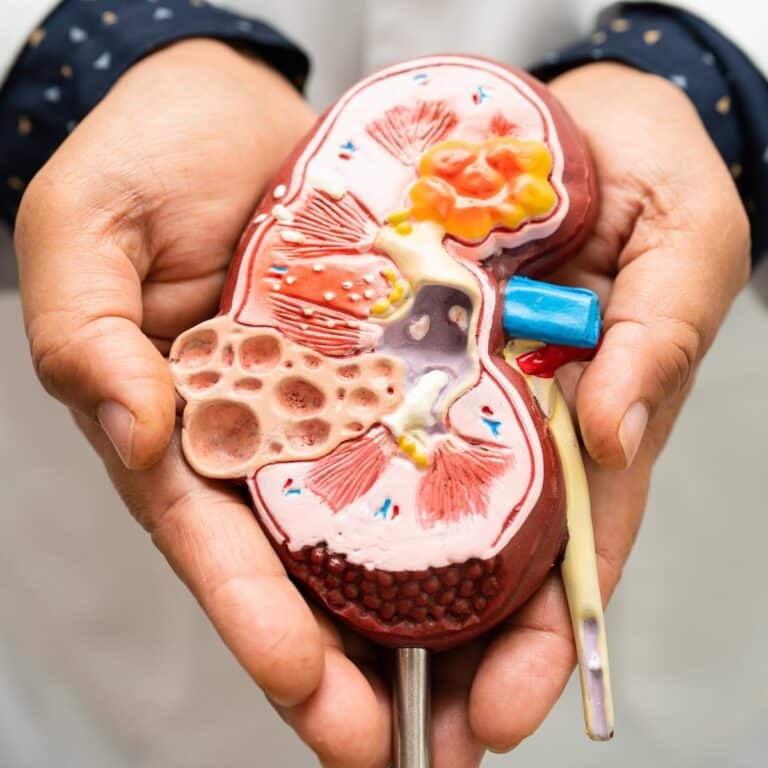Benefits and Effects of CBD For Chronic Kidney Disease
Are you or someone you love living with chronic kidney disease (CKD)? This condition can have a significant impact on your quality of life, causing chronic pain, inflammation, and loss of appetite.
While traditional treatment options are limited, there is growing interest in the therapeutic potential of Cannabidiol (CBD) oil for managing symptoms of kidney disease.
Early studies suggest that CBD may be able to reduce symptoms associated with the complications of CKD. However, it's important to consult with your healthcare provider before using CBD oil for kidney disease due to the possibility of potential harm which may depend on a patient’s specific condition and how it’s used.

In this article, we'll explore the latest research on CBD and its beneficial effects for those living with chronic kidney disease.
Jump to:
Overview
Chronic kidney disease affects millions of people in the US alone, and early detection is key to managing it effectively. Major risk factors such as high blood pressure and diabetes contribute to this growing number.
Chronic kidney disease (CKD) is a progressive and long-term condition that affects the kidneys, which are vital organs responsible for filtering waste products and excess fluids from the blood.
CKD develops gradually over time and is often asymptomatic in the early stages, making it challenging to detect without regular medical check-ups.
The leading causes of CKD include diabetes, high blood pressure (hypertension), and certain genetic disorders. Other factors that can contribute to the development of CKD include obesity, smoking, a family history of kidney disease, and certain medications.
As CKD progresses, the kidneys' ability to function properly diminishes. Waste products, such as urea and creatinine, start to accumulate in the blood, leading to a condition called uremia. This can result in a range of symptoms, including fatigue, swelling in the legs and ankles, shortness of breath, nausea, and decreased appetite.
CKD is typically classified into five stages, with stage 1 being the mildest and stage 5 indicating end-stage renal disease (ESRD anemia) or kidney failure, where the kidneys have lost nearly all of their function. End-stage renal disease requires dialysis or a kidney transplant to sustain life.
Diagnostic tests for kidney disease include blood tests, imaging tests, urine tests, and kidney biopsy. Treatment options often focus on managing symptoms since there is no established cure for this long-term condition.
Managing CKD involves various approaches. Lifestyle modifications, such as adopting a healthy diet low in sodium, saturated fats, and phosphorus, as well as regular exercise and maintaining a healthy weight, can help slow the progression of the disease. Controlling underlying conditions like diabetes and hypertension is crucial in managing CKD.
In addition to lifestyle changes, medication may be prescribed to manage complications and slow the progression of CKD. Medications can include those that control blood pressure, reduce cholesterol levels, manage anemia, and alleviate symptoms such as swelling and high blood pressure.
Regular monitoring of kidney function through blood tests, such as measuring serum creatinine and estimated glomerular filtration rate (eGFR), is essential to track the progression of CKD and make informed treatment decisions.
CBD oil may offer promising benefits to patients with chronic kidney disease by reducing inflammation and oxidative stress. However, as there is currently limited evidence available, further human studies are needed to make sure that the benefits are maximized and any potential harm is avoided.
It's essential to monitor renal function closely if using CBD products along with other medications used to treat kidney disease. More research is needed before any definitive conclusions can be made regarding its safety or efficacy for individuals with chronic kidney disease or other types of kidney diseases.
For More Recipes and Ideas --->> Get Your Free Meals and Recipes That Are Perfect for Pre-Dialysis Diets, Pre-Dialysis with Diabetes, or Dialysis Diets.

CBD and Its Mechanisms
Managing and monitoring kidney health is essential for individuals at risk of renal disease, and exploring alternative treatments like CBD can provide hope for those seeking relief from symptoms and complications.
- Cannabidiol (CBD) is one of the main active compounds in cannabis. It is a naturally occurring substance found in the cannabis plant (Cannabis sativa) or hemp plant.
- CBD has become increasingly popular in recent years due to its potential medicinal and therapeutic benefits. It is thought to interact with the body's endocannabinoid system (ECS) and various cannabinoid receptors throughout the body.
- The ECS is an important homeostatic regulator in the body. It is responsible for maintaining balance in the body, and helps to regulate a variety of processes including stress response, sleep, memory, pain perception, and appetite.
- The ECS is made up of two types of molecules, endocannabinoids and cannabinoids receptors.
Endocannabinoids are molecules produced naturally by the body to bind to the cannabinoid receptors located throughout the body and send signals throughout the nervous system. The two main endocannabinoids are anandamide and 2-arachidonoylglycerol (2-AG).
The cannabinoid receptors are the targets for endocannabinoids and cannabinoids. They are located in the central and peripheral nervous systems and are responsible for transmitting signals from endocannabinoids to the body.
When CBD is taken, it binds to cannabinoid receptors in the body and mimics the psychotropic effects of the endocannabinoids. The two main cannabinoid receptors that bind with CBD are the CB1 and CB2 receptors.
The CB1 receptor is primarily found in the central nervous system, and it is responsible for mediating the effects of CBD on pain, mood, appetite, memory, and other functions. The CB2 receptor is mainly found in the peripheral nervous system and is involved in regulating inflammation and immune response.
CBD has a variety of potential therapeutic benefits, and it is thought to work by activating the endocannabinoid system and binding to cannabinoid receptors. It is thought to help reduce inflammation, pain, anxiety, depression, seizures, and other conditions.
Research is ongoing into the exact mechanisms of action of CBD, and more studies are needed to understand how it works in the body.
CBD is believed to have therapeutic effects on kidney health by reducing inflammation and oxidative stress in the kidneys. This could potentially lead to anemia prevention as well as a reduced risk of developing bone disease, high blood pressure, and cardiovascular disease.
However, it's important to note that not all studies have found positive effects of CBD on kidney function. High doses of CBD may cause liver damage, which in turn could impact kidney function. Additionally, CBD can interact with medications commonly used to treat kidney disease such as blood pressure medications and immunosuppressants.
Therefore, individuals with CKD should monitor their renal function closely if they choose to use CBD products. It's crucial that individuals with kidney disease regularly check their renal health with healthcare providers to determine the best management plan for them.
Potential Benefits of CBD & CKD
Exploring how CBD can potentially support kidney health and alleviate symptoms offers hope for individuals seeking alternative treatment options. Taking steps for improving kidney health is important!
CBD has shown promising results in reducing inflammation, which is a common cause of kidney damage. By decreasing inflammation, CBD may help improve overall kidney function.
Additionally, CBD oil has been linked to pain relief and appetite regulation, two symptoms commonly experienced by individuals with chronic kidney disease. CBD's efficacy in managing symptoms associated with chronic kidney disease makes it an attractive option for patients seeking alternative treatments.
Pain management is often a significant concern for those suffering from this medical condition, and traditional pain medications like prescription opioids may have adverse effects or interactions with other medications. Medical cannabis may have analgesic benefits for patients with kidney disease who suffer from chronic neuropathic pain.
Similarly, loss of appetite can lead to weight loss and malnourishment, both of which exacerbate the complications associated with CKD. By regulating appetite levels, CBD oil could help prevent these complications.
Currently, 14% of Americans are medical cannabis users primarily indicated for for various symptoms and chronic diseases such as for pain relief, reducing anxiety, improving sleep, and managing arthritis. CBD has been found to be safe, well tolerated, and effective in treating different neurological and psychiatric conditions.
As always, patients should discuss any potential treatments with their healthcare provider before use to ensure they're suitable candidates.
Dosage and Administration
Before starting any new medication or supplement regimen, it's important to consult with your healthcare provider. They can offer guidance on the optimal dosage and effective administration of CBD oil for your specific condition and medical history. Dosage calculations may vary depending on factors such as weight, age, and severity of kidney disease.
Once you have established a recommended dose with your healthcare provider, it's essential to monitor the effects of CBD oil on your kidneys closely. Dosage adjustments may be necessary over time based on changes in symptoms or renal function.
It's also crucial to follow proper administration techniques to ensure maximum absorption and effectiveness of the product.
Moreover, because there are no established dosages or administration methods for using CBD oil to treat CKD, patients must work closely with their doctor or medical professional to determine what dosage works best for them while also monitoring their renal function regularly.
By working closely with your healthcare provider and monitoring dosage carefully, you can safely incorporate CBD oil into your kidney disease management plan.

CBD's Impact on Kidney Function
CBD, a compound derived from cannabis, has shown potential in benefiting kidney function. Research suggests that CBD's interaction with CB1 receptors may help reduce protein excretion, a common problem in kidney disease.
This could be due to CBD's ability to regulate the production of VEGF, a protein associated with the expression of nephrin, a key component of kidney function. Furthermore, CBD's CB1 antagonism might also help improve renal function by reducing cell death in the glomerular and proximal tubular regions of the kidneys.
However, more clinical studies are required to confirm these findings in living organisms and understand CBD's full impact on kidney health.
High doses of CBD may cause liver damage, which in turn could impact kidney function. Additionally, CBD can interact with medications commonly used to treat kidney disease, such as blood pressure medications and immunosuppressants.
To ensure the safety and efficacy of using CBD for kidney disease, it's crucial to consult with a healthcare professional before use. Dosage is also an important consideration when using CBD for any condition.
Patients with kidney disease may require higher doses of CBD oil for the effects to show. Moreover, since CBD oils come in different concentrations, it can be challenging to calculate the exact amount of CBD per milliliter of oil.
If you have CKD or another type of kidney disease, monitoring your renal function closely is essential if you choose to use any form of cannabis product including those containing CBD.
Risk Factors and Precautions
It's crucial to be aware of the risk factors and precautions associated with using cannabis products for individuals with kidney issues. Precautionary measures should be taken by those who have chronic kidney disease or other kidney diseases before taking CBD products.
High doses of CBD may cause elevated levels of liver enzymes, which could be an indication of liver damage. Liver damage can be particularly detrimental to people who already have chronic kidney disease.
Another important consideration is that CBD can also interact with medications commonly used to treat kidney disease, such as blood pressure medications and immunosuppressants.
Medication interactions can render the drugs to be less effective in their intended use, which may cause complications in patients with kidney disease. Another possible effect is increasing the side effects of medications, which can also be harmful for patients. Understanding ckd and diabetes medications gets easier as time goes on.
To better manage risk factors and minimize complications for people with kidney disease, lifestyle modifications are important precautionary measures.
Dietary restrictions are a vital aspect of managing chronic kidney disease. Patients must limit their intake of certain foods that contain high levels of phosphorus, potassium, and sodium to ensure their kidneys don't have to work too hard to filter out excess minerals from the bloodstream.
Lifestyle modifications are also essential in preventing progression of symptoms for CKD. Patients need regular exercise, enough sleep, and stress management techniques like meditation or deep breathing exercises.
Early detection is key when it comes to managing chronic kidney disease effectively. People with risk factors for developing Kidney Disease should consider regular check-ups with their healthcare provider to monitor their renal health closely if they choose to use CBD products.
It's important for patients with Chronic Kidney Disease (CKD) or any other form of Kidney Disease to discuss any potential risks associated with using cannabis products with their doctor before starting any new treatment regimen or making changes in medication dosages.
As well as dietary and lifestyle habits that could affect their condition negatively or positively without proper consultation beforehand.
CBD Products and Regulation
If you're curious about using cannabis for your kidney health, it's important to know that regulations are still restrictive towards research in this area and there is a limited understanding of its impact on people with kidney disease.
However, it's worth noting that cannabis use is particularly high among those over 50 years old and even more so among those over 65 years old. In the United States, as of 23 states and the District of Columbia have medicinal cannabis programs.
Renal function should be closely monitored in those with chronic kidney disease (CKD) who are considering cannabis use. The lowest effective dose of cannabis should be used, and smoking should be avoided as it may delay transplant candidate listing or contribute to ineligibility.
Federal regulations remain prohibitively restrictive towards prospective research on cannabis use and kidney disease. Without further studies, a knowledge gap and lack of evidence will persist regarding the impact of cannabis use on people with CKD.
As you navigate the current section on CBD products and regulation, you'll gain a better understanding of the challenges associated with regulating CBD products and how to identify safe, high-quality products that may potentially aid in the management of chronic kidney disease symptoms.
The CBD market is currently unregulated, which makes it difficult for consumers to know what they are purchasing. Many companies make false health claims about their products, and some even mislabel their products by stating incorrect concentrations of CBD.
To ensure that you're purchasing safe and effective CBD products for kidney disease symptom management, it's crucial to look for third-party lab results and certificates of analysis. These documents provide proof that the product has been tested by an independent laboratory and contains the amount of CBD advertised on its label.
When shopping for CBD products, also look for those made from organic hemp plants grown in the United States without pesticides or chemicals.
Despite growing concerns about CBD safety concerns such as potential liver damage at high doses or interactions with other medications used to treat kidney disease like blood pressure medication or immunosuppressants, research studies show promising results regarding its efficacy in alleviating symptoms caused by CKD, such as chronic pain syndromes.
Hence, patients with CKD or other kidney diseases who are interested in using cannabis products must exercise caution when doing so.
More importantly, individuals should consult their healthcare provider before using any form of CBD product. To reap the potential benefits of this substance safely, patients should consult with healthcare providers before trying any new treatments or supplements including Cannabidiol (CBD) oil.
Conclusion and Future Directions
The unregulated nature of the CBD market presents challenges for consumers seeking safe and effective products to manage symptoms associated with renal health, highlighting an urgent need for further research to find substantial evidence regarding its potential therapeutic role.
As more people turn to alternative therapies to complement conventional treatment options for chronic kidney disease and its complications, patient education on the potential benefits and risks of using CBD is essential.
Healthcare policy has a critical role in keeping up with the rapidly evolving landscape of CBD products including synthetic cannabinoids, ensuring that patients have access to high-quality, tested products.
Future research is needed to fully understand the effects of CBD on kidney health and its potential as a treatment option for CKD.
While there is some evidence suggesting that CBD may have anti-inflammatory properties that could benefit individuals with CKD, it's important to note that not all studies have found positive effects on kidney function and that there are potential harmful effects.
Thus, before any definitive conclusions can be made regarding the safety or efficacy of using CBD for CKD or other kidney diseases, more research needs to be done.
In all, while preliminary studies show promise in using CBD as a complementary therapy for managing symptoms associated with CKD, much remains unknown about its long-term effects on renal function.
Patients should talk to their healthcare providers before considering adding CBD products into their treatment regimen and use only regulated products from reputable manufacturers who are transparent about their production process and third-party testing results.
With continued research and regulatory oversight backed by sound healthcare policies, we can better understand how alternative therapies like medical cannabis fit into comprehensive treatment plans for individuals living with chronic kidney disease. Knowing all of the commonly prescribed medications for CKD can also help you know what to ask when you're talking to your doctor.
FAQs for CBD & Kidney Disease
Unfortunately, there's currently no cure for kidney disease. For those with renal failure, treatment of kidney disease is limited to dialysis and kidney transplant.
While CBD may have medicinal benefits for managing symptoms such as pain relief and mood regulation, it cannot cure the condition. However, some patients with kidney disease have reported positive experiences using CBD oil as an alternative treatment alongside medical supervision.
It's important to note that CBD efficacy with kidney disease is still being researched, and patients should always consult with their healthcare provider before using any new treatments or supplements.
While CBD may offer some potential benefits for kidney health, it should not be seen as a cure and should always be used under medical supervision.
When it comes to using CBD for kidney disease, it's crucial to find a safe dosage. It's important to note that CBD can interact with medications commonly used to treat kidney disease, so it's essential to consult with your healthcare provider before adding CBD to your treatment regimen.
In general, the lowest effective dose should be used and this will be determined based on individual factors. Studies suggest that CBD may help manage pain, reduce inflammation, and relieve anxiety in individuals with kidney disease. Take the proper steps to improving kidney health.
However, more research is needed on the long-term effects of CBD use on kidney function. If you decide to use CBD products for kidney disease, monitor your renal function closely and start with a low dose before gradually increasing as needed.
In healthy individuals, the use of cannabis does not appear to have a detrimental impact on kidney function. Research suggests that cannabis consumption, particularly the use of CBD, does not negatively affect the normal functioning of the kidneys.
While further studies are needed to fully understand the long-term effects and potential benefits of cannabis on kidney health, current evidence indicates that cannabis use does not pose a significant risk to kidney function in individuals without pre-existing kidney conditions.
It's important to note that individual responses to cannabis may vary, and consulting with a healthcare professional is always advisable.
When it comes to using CBD for kidney disease, there are potential risks and precautions that must be taken into consideration.
One of the main concerns is the interaction between CBD and medication commonly used to treat kidney disease, such as blood pressure medications, immunosuppressants, diabetes medications, and supplements.
Additionally, high doses of CBD has risk of liver damage which can present as elevated levels of liver enzymes. Overall, while CBD has shown promise for managing certain symptoms related to kidney disease, caution should be exercised when incorporating it into your treatment plan.
If You Have CKD, Use CBD With Caution
Overall, the potential benefits of CBD oil for chronic kidney disease are promising, but more research is needed to fully understand its effects. While early studies suggest that CBD may reduce inflammation and improve some common symptoms of kidney disease, it is important to consult with a healthcare provider before using CBD oil as a treatment option.
Moreover, high doses of CBD may have harmful effects on the liver and interact with prescription medications commonly used to treat kidney disease. Indeed, exploring alternative treatments for chronic kidney disease is crucial for improving patient outcomes.
With this, CBD oil may offer some relief from symptoms such as pain and loss of appetite, but it should be used cautiously and under medical supervision.mAs with any new treatment approach, it is important to weigh the potential benefits against the risks and limitations.













